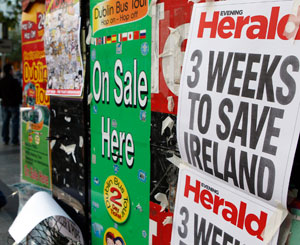Ireland bailout: officials negotiate rescue deal
Negotiations over a multi-billion euro bailout with the IMF and EU continue, as the Irish Government faces calls for a General Election from a coalition partner. Faisal Islam examines the budget plan.
Ireland’s Green Party, the junior partner in its coalition government, said today it believed a General Election should be held early in January after a series of fiscal plans and the 2011 Budget had been produced and passed.
Ireland’s coalition government of Fianna Fail, the Greens and independent politicians has a wafer thin majority in parliament and its popularity has plummeted over its handling of the country’s financial and economic crisis.
John Gormley, Green Party leader and Environment Minister, said he wanted a date for the vote to be set some time in the second half of January.
“The past week has been a traumatic one for the Irish electorate. People feel misled and betrayed,” he said.
“But we have now reached a point where the Irish people need political certainty to take them beyond the coming two months. So we believe it is time to fix a date for a general election in the second half of January 2011.”
Bailout
The call came just 24 hours after the European Union (EU) and International Monetary Fund (IMF) agreed to help Ireland with a three-year bailout package after the country finally agreed for financial aid yesterday.
Ireland debt crisis: planned cuts
It emerged that the 160 page four-year budget plan has already been circulated in draft form to Europe's finance ministers and the IMF, before being shown to Ireland, writes Economics Editor Faisal Islam.
Some details are emerging. A 10 per cent cut in social welfare payments, a €1 cut to the minimum wage, 28,000 public sector job cuts have all been concretely reported here in Dublin.
If the plan follows that of Greece, I would imagine that Ireland's 21 per cent VAT rate is also in peril, which will be music to the ears of supermarkets across the border.
All of this effort is aimed at cutting €10bn of further spending and raising an extra €5bn of taxes by 2014, to close Ireland's gaping deficit.
Read more: Ireland's spending cuts
Ireland is expected to receive financial loans which could total 80 to 90 billion euros. The UK and Sweden have also offered direct loans.
The markets welcomed the news of a bailout with both the euro and global shares rising in value.
‘Friend in need’
Chancellor George Osborne said today it was in Britain’s “national interest” to offer a loan to help with the bailout.
Mr Osborne said Britain has offered to give a direct bilateral loan to Ireland of around £7bn.
The loan would amount to “billions not tens of billions”, he told BBC Radio 4.
Britain’s role in an international rescue package was important due to the close economic ties with Ireland, Mr Osborne said.
“We will be a good neighbour when we can afford to be,” the chancellor said. “And in the last six months we have moved Britain out of the financial danger zone”.
“Ireland is a friend in need. We’re here to help.”
Mr Osborne said details of the international rescue package would be worked out by the end of the month.

Bailout talks
Taoiseach Brian Cowen said the amount and terms of the rescue package would be negotiated in the coming days.
Under the bailout scheme, income tax will increase but the country’s low 12.5 per cent corporation tax, which the Government dubbed a red-line deal-breaker if forced into negotiations, will not be touched.
Little other detail of the package has been revealed by the Government, with Taoiseach Brian Cowen and Finance Minister Brian Lenihan reluctant to name their price.
They also refused to be drawn on debt levels the country is facing, how long loans will run for or if money will be drawn down by banks for certain.
The financial crisis has been bought on by the recession and by the almost total collapse of Ireland’s banks.
The country’s state running costs are 19bn euro (£16.3bn) in the red. The deepening crisis has been in the banks, with about 23bn euro (£19.7bn) of deposits shifted out of Ireland this year and prohibitive borrowing rates on the international markets.
An asset sell-off in the banks may also be looked at under the terms of the deal, Mr Lenihan said.
The plan has the backing of the IMF, the EU, G7 countries and Britain and Sweden, who are lining up bilateral aid.
Austerity measures
As talks continue the Government will push ahead with the publication of spending cuts with an estimated 15 billion euro (£12.8bn) savings to be unveiled.
Department of Finance number-crunchers are also analysing the finer details of Ireland’s Budget 2011, due on 7 December.
Mr Lenihan said the 8.65 euro (£7.40) minimum wage, the second highest in Europe, will have to be looked at. Social welfare cuts and new taxes are also on the cards.